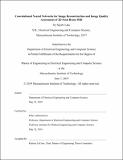Convolutional neural networks for image reconstruction and image quality assessment of 2D fetal brain MRI
Author(s)
Lala, Sayeri.
Download1129390924-MIT.pdf (19.41Mb)
Other Contributors
Massachusetts Institute of Technology. Department of Electrical Engineering and Computer Science.
Advisor
Elfar Adalsteinsson.
Terms of use
Metadata
Show full item recordAbstract
Fetal brain Magnetic Resonance Imaging (MRI) is an important tool complementing Ultrasound for diagnosing fetal brain abnormalities. However, the vulnerability of MRI to motion makes it challenging to adapt MRI for fetal imaging. The current protocol for T2-weighted fetal brain MRI uses a rapid signal acquisition scheme (single shot T2-weighted imaging) to reduce inter and intra slice motion artifacts in a stack of brain slices. However, constraints on the acquisition method compromise the image contrast quality and resolution. Also, the images are still vulnerable to inter and intra slice motion artifacts. Accelerating the acquisition can improve contrast but requires robust image reconstruction algorithms. We found that a Convolutional Neural Network (CNN) based reconstruction method scored significantly better than Compressed Sensing (CS) reconstruction when trained and evaluated on retrospectively accelerated fetal brain MRI datasets of 3994 slice images from 10 singleton mothers. On 8-fold accelerated data, the CNN scored 13% NRMSE, 0.93 SSIM, and PSNR of 30 dB compared to CS which scored 35% NRMSE, 0.64 SSIM, and PSNR of 20 dB. The results suggest that CNNs could be used to reconstruct high quality images from accelerated acquisitions, so that contrast quality could be improved without degrading the image. Automatically evaluating the image quality for artifacts like motion is useful for noting what images need to be reacquired. On a novel fetal brain MRI quality dataset of 4847 images from 32 mothers with singleton pregnancies, we found that a fine-tuned Imagenet pretrained neural network scored 0.8 AUC (95% confidence interval of 0.75-0.84). Saliency maps suggest that the CNN might already focus on the brain region of interest for quality evaluation. Evaluating the quality of an image slice takes 20 ms on average, which makes it feasible to use the CNN for flagging nondiagnostic quality slice images for reacquisition during the brain scan. Our findings suggest that CNNs can be used for rapid image reconstruction and quality assessment of fetal brain MRI. Integrating CNNs into the protocol for T2-weighted fetal brain MRI is expected to improve the diagnostic quality of the brain image.
Description
This electronic version was submitted by the student author. The certified thesis is available in the Institute Archives and Special Collections. Thesis: M. Eng., Massachusetts Institute of Technology, Department of Electrical Engineering and Computer Science, 2019 Cataloged from student-submitted PDF version of thesis. Includes bibliographical references (pages 63-67).
Date issued
2019Department
Massachusetts Institute of Technology. Department of Electrical Engineering and Computer SciencePublisher
Massachusetts Institute of Technology
Keywords
Electrical Engineering and Computer Science.